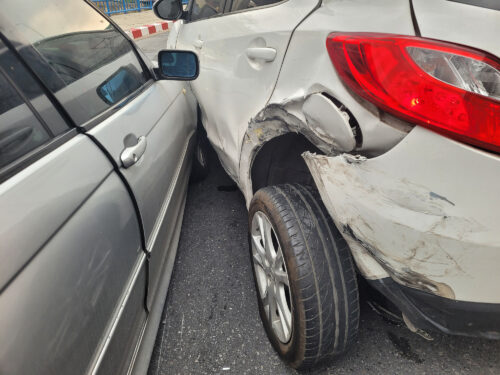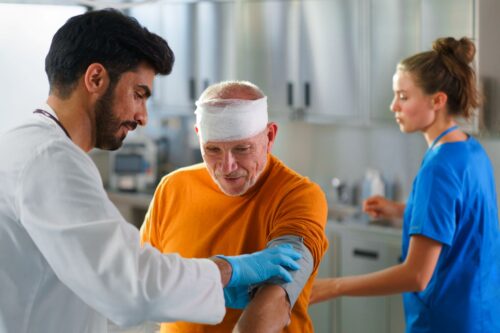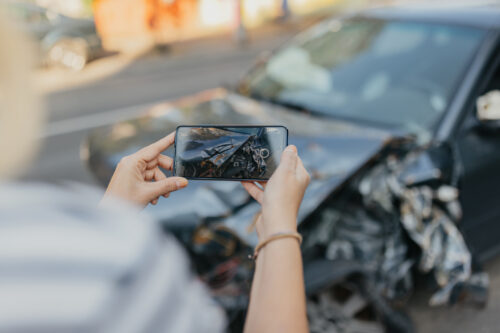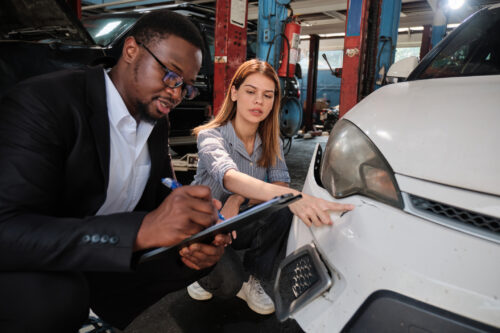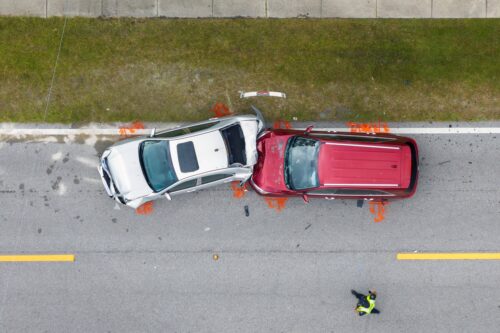
After a car accident, injuries don’t always appear right away. Sometimes, it can take days or even weeks for symptoms to show, especially with low-impact car accident injuries. Even if your crash seemed like a minor accident, you could still suffer from serious medical issues.
There are many types of accident injuries that can occur in a crash, ranging from soft tissue damage to life-altering trauma. Some injuries heal with time, while other car accident injuries require surgery or extensive treatment. Understanding these most common car accident injuries can help you recognize symptoms early and take the right steps to protect your health.
If you’ve been injured in a car accident, you don’t have to face the aftermath alone—our team is here to help with a free case review and legal guidance to pursue the compensation you may deserve.
1. Soft Tissue Injuries
Any damage to muscles, ligaments, or tendons is considered a soft tissue injury, and these are by far the most common type of injury following an accident. Soft tissue injuries include strains or sprains to the head and neck, usually in the form of whiplash: the most common injury in a car crash.
- Sprains & Strains: Overstretching or tearing of ligaments (sprains) and muscles or tendons (strains) can cause swelling, bruising, and discomfort.
- Whiplash: A sudden back-and-forth neck motion, common in rear-end collisions, can lead to headaches, dizziness, and reduced range of motion.
- Bruising & Contusions: The force of the impact can cause blood vessels to break under the skin, resulting in painful bruising and swelling.
When To See a Doctor
Minor soreness and stiffness may go away with rest, ice, and over-the-counter pain relievers. However, if you experience severe swelling, persistent pain, or difficulty moving, you may require immediate medical treatment.
Whiplash symptoms like headaches, dizziness, or numbness should also be checked by a doctor, as they could indicate nerve damage or a more severe neck injury.
2. Fractures & Broken Bones
The impact of a car accident can place immense force on the body, leading to fractures and broken bones. Any bone can break in a crash, but the legs, ribs, and pelvis are especially vulnerable due to the positioning of the body and the force of the collision.
- Pelvic Fractures: Side-impact crashes or high-speed collisions can put extreme pressure on the pelvis, causing painful fractures that may require surgery.
- Leg Fractures: The legs can be pinned or struck by the dashboard, causing breaks in the femur, tibia, or fibula.
- Rib Fractures: The force of a seatbelt or impact with the steering wheel can crack or break ribs, which can make breathing painful and, in severe cases, lead to internal injuries.
When To See a Doctor
Any suspected fracture should be evaluated by a doctor. Severe pain, swelling, bruising, or an inability to bear weight on a limb could indicate a broken bone. Rib fractures can be particularly dangerous.
If you experience shortness of breath or sharp pain while breathing, seek emergency care immediately, as this could signal a punctured lung or internal bleeding.

3. Head, Neck, & Spine Injuries
Head injuries are very common following an accident, often occurring when the head impacts an object like the steering wheel, dashboard, or window. While some head injuries may be mild, serious trauma can lead to complications such as internal bleeding or concussions. If you hit your head in a car accident, it’s important to get checked by a doctor, even if you feel fine at first.
- Spinal Cord Injuries: Damage to the spinal cord can cause severe pain, numbness, or even paralysis, depending on the location and severity of the injury.
- Herniated Discs: The sudden force of a crash can cause the discs between the vertebrae to shift or rupture, leading to pain, tingling, or weakness in the arms and legs.
- Concussions: A sudden jolt or impact can cause the brain to move within the skull, leading to headaches, dizziness, confusion, and sensitivity to light or sound.
- Traumatic Brain Injury (TBI): More severe than a concussion, a TBI can result in memory loss, cognitive difficulties, personality changes, and, in extreme cases, permanent impairment.
When To See a Doctor
Any head, neck, or spine injury should be taken seriously. If you experience persistent headaches, dizziness, nausea, confusion, numbness, or difficulty moving any part of your body, you need emergency medical attention. Even a mild concussion can have lasting effects, and spinal injuries may worsen without prompt treatment.
4. Internal Injuries
Internal injuries are among the most dangerous because they may not be immediately obvious after a crash. The force of impact can cause damage to organs, blood vessels, or tissues, leading to internal bleeding and other serious complications. Without prompt treatment, internal injuries can become life-threatening.
Signs of Internal Bleeding:
- Abdominal pain or swelling could indicate damage to internal organs.
- Deep bruising, especially around the torso or chest may signal bleeding under the skin.
- Dizziness, fainting, or confusion is a sign of significant blood loss.
- Shortness of breath could indicate a lung or chest injury.
When To See a Doctor
If you experience unexplained bruising, intense pain, dizziness, or any symptoms of internal bleeding, go to the Emergency Room. While soreness after an accident is common, persistent or worsening pain in the abdomen or chest could indicate internal injuries that require urgent care.
5. Burns, Cuts, & Lacerations
Scrapes and cuts are some of the most common injuries in a car accident, often caused by loose objects in the vehicle, shattered glass, or airbag deployment. Deeper lacerations can lead to excessive bleeding, infection, or permanent scarring.
Burns may also occur if the accident results in a fire, explosion, or contact with hot surfaces or chemicals.
When To See a Doctor
If you have a deep laceration, uncontrolled bleeding, signs of infection (such as redness, warmth, or pus), or burns that cover a large area, seek medical attention immediately. When EMTs arrive at the scene, always have them check any scrapes or cuts—even if they seem minor—to prevent complications.
6. Psychological Injuries
Not all injuries from a car accident are physical—many victims suffer from psychological injuries that can have long-term effects on their well-being. The trauma of a crash can lead to post-traumatic stress disorder (PTSD), anxiety, depression, and emotional distress, all of which may require professional treatment.
When To See a Doctor
If you experience persistent anxiety, depression, nightmares, or a fear of driving that interferes with daily life, seeking professional help is important. Psychological injuries can be just as serious as physical ones, and treatment—such as therapy or medication—may help you recover. If your accident-related trauma is affecting your ability to work, drive, or engage in daily activities, you may be entitled to compensation for pain and suffering.
Every Injury Is Different
Some car accident injuries heal on their own, while others can have life-altering consequences. Even within the same vehicle, passengers and drivers may experience completely different injuries due to their position at the time of impact. Children are especially vulnerable, reminding us to use appropriate safety seats or restraints based on their height and weight.
Factors That Affect Car Accident Injuries:
- Seat belt use. Wearing a seat belt can significantly reduce the risk of severe injuries.
- Point of impact. Injuries may vary depending on whether the crash was a front-end, side-impact, or rear-end collision.
- Body position at impact. A person facing straight ahead may be injured differently than someone turned to the side.
- Airbag deployment. Properly functioning airbags can help reduce the force of impact.
- Speed of the vehicles. Higher speeds generally result in more severe injuries.
Because every accident is different, it’s always best to seek medical attention after a crash, even if you don’t feel injured right away. Some symptoms may take time to appear, and early treatment can prevent complications.

What To Do If You Were Injured in a Car Accident
After a car accident, taking the right steps can make a big difference in your recovery and any potential legal claim.
- Get Medical Care Right Away: Some injuries aren’t immediately noticeable, so seeing a doctor ensures that any hidden issues are diagnosed and documented.
- Stick to Your Treatment Plan: Following medical advice and completing treatments can support your recovery and help strengthen your case.
- Keep Records of Everything: Save all medical reports, accident details, and correspondence with insurance companies.
- Be Cautious With Insurance Adjusters: Insurers may try to downplay your injuries. Before making a statement, consider consulting a lawyer.
- Talk to a Car Accident Lawyer: A legal professional can explain your rights and help you seek the compensation you may be entitled to.
Jim Glaser Law Offers Free Consultations
Insurance companies often try to minimize payouts, leaving you without the full compensation you may need to recover. A car accident lawyer can handle the legal process for you, negotiating with insurers, gathering evidence, and ensuring your rights are protected.
If your injuries require extensive medical care or impact your ability to work, an attorney can help you pursue damages for medical expenses, lost income, pain and suffering, and more. Having legal representation can make a significant difference in the outcome of your case.
At Jim Glaser Law, we understand how overwhelming an injury can be. That’s why we offer free consultations to help you understand your rights and legal options. If you were injured in a Boston car accident, our team is ready to fight for fair compensation.



